Unveiling the Ancient and the Current: From Pterosaur Fossils to Spacecraft Deliveries
Recent discoveries and events in science include a fossil of a baby pterosaur caught in ancient tropical storms, wild chimpanzees consuming fermented fruit with alcohol, a 10-million-year-old dolphin-like creature found in Peru, insects preserved in Ecuador's amber, and a Northrop spacecraft set for ISS cargo delivery.

In a fascinating glimpse into Earth's ancient past, fossils reveal the tale of a baby flying reptile, a pterosaur, caught in tropical storm winds 150 million years ago. Despite its ability to fly, the storm's power overwhelmed it, leading to its untimely demise in a lagoon.
Meanwhile, a study of wild chimpanzees highlights their consumption of ripe, fermenting fruit, surprising researchers with the revelation that chimps ingest alcohol equivalent to two human cocktails daily. The study spanned two research sites in Uganda and Ivory Coast, reinforcing our understanding of primate diets.
In other headlines, Peruvian paleontologists unveiled a dolphin-like fossil dated 8 to 12 million years old in the Ocucaje Desert. In Ecuador, amber from the Cretaceous Period is key to unraveling the ecosystem 112 million years ago. Additionally, a Northrop Grumman spacecraft will deliver crucial cargo to the International Space Station, having overcome software issues.










